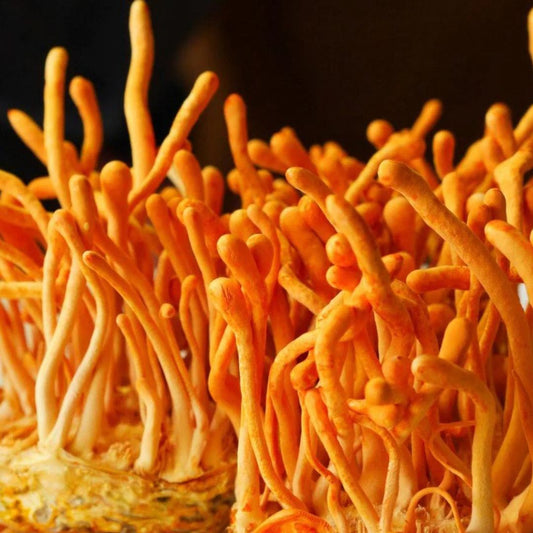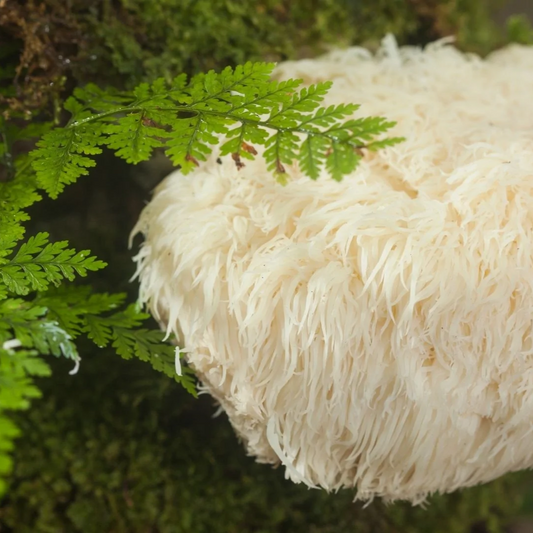Table of Contents
The humble mushroom has been used for its medicinal properties for centuries, and modern research has confirmed its potential benefits for physical and mental health and well-being. These discoveries have led to a recent 'shroom boom', with fascinating fungi now featuring in everything from wellness capsules and powders to smoothies and even trendy mushroom lattes.
Of course, we're not just talking about the common chestnut or button variety on the shelves of your local Tesco. There are over 10,000 mushroom types present in an abundance of weird and wonderful shapes and sizes (and there are undoubtedly thousands more fungi species we've yet to discover).
Many of these marvellous mushrooms contain potent antioxidants, anti-inflammatory compounds, and other bioactive substances that can help support a healthy immune system and promote overall well-being. What's more, you needn't whip up a culinary delight to enjoy medicinal mushrooms - the most common way to benefit from them is to add a spoonful of powder to your dish (or beverage), or simply swallow a health-boosting shroom-filled capsule.
Want to know more? In this article, we will explore what functional mushrooms are, the 10 best mushrooms for your health and discuss their unique potential benefits.
What are Medicinal Mushrooms?
Medicinal mushrooms are types of fungi that have been traditionally used (for thousands of years) for their healing properties. Greek physician Hippocrates, 5th-century alchemist Tao Hongjing and the first peoples of North America were all advocates of functional mushrooms for healing and health. Yes, medicinal mushrooms are believed to have a vast array of wellbeing benefits and although utilised traditionally in medicine, contemporary science has finally acknowledged the phenomenon that our ancestors have known for ages - that mushrooms contain potent and curative properties.
Medicinal mushrooms contain a range of bioactive compounds, including beta-glucans, flavonoids, polysaccharides, terpenes, triterpenoids, and sterols, which have been found to have immune-modulating, anti-inflammatory, and antioxidant properties. Some popular medicinal mushrooms include reishi, shiitake, maitake, lion's mane, chaga, and cordyceps.
Medicinal mushrooms can be consumed in various forms, including capsules, extracts, teas, and powders. They are commonly used as supplements to support immune function, reduce inflammation, and improve overall health and wellbeing.
Which Mushrooms Have the Best Health Benefits?
Medicinal mushrooms offer an extensive assortment of health benefits, from enhancing brain function to balancing hormones and even providing powerful immune support. Still, every mushroom is distinct in its own way; each provides unique advantages that are beneficial for health. Here at Boom Shroom, we love all mushrooms and after many years of experimenting with a plethora of functional fungi, we've narrowed down our top 10 favourite mushrooms which have consistently proved to be most advantageous to our overall sense of well-being.
Here are our top 10 healthiest mushrooms (tried, tested and top-rated, but in no particular order):
1. Turkey Tail mushroom (Trametes versicolor)
Turkey Tail is rich in antioxidants and often used for immune support, improved gut health and energy. Resembling the feathers of a turkey's tail, the mushroom has been studied in modern science for its potential in enhancing the efficacy of some cancer treatments by reducing the risk of secondary cancerous tumours developing.
Turkey Tail is best for:- Good gut health
- Immune support
- Energy boosting
- Improved athletic performance
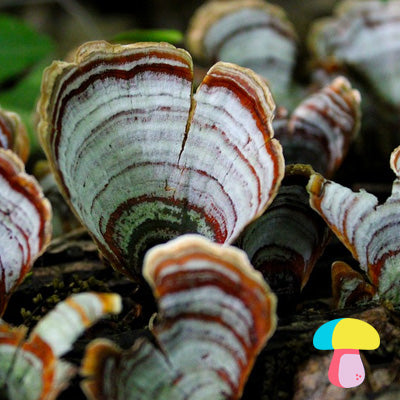
2. Lion's Mane mushroom (Hericium erinaceus)
Just as its name implies, Lion's mane displays a white and shaggy head resembling the mane of a lion. The fungus is also known as the "brain mushroom" and has been used traditionally to nourish the brain, improve cognition and support nerve growth factor production.
Lion's mane is best for:
- Cognitive support
- Improved focus and memory
- Anxiety relief
- Mood boosting
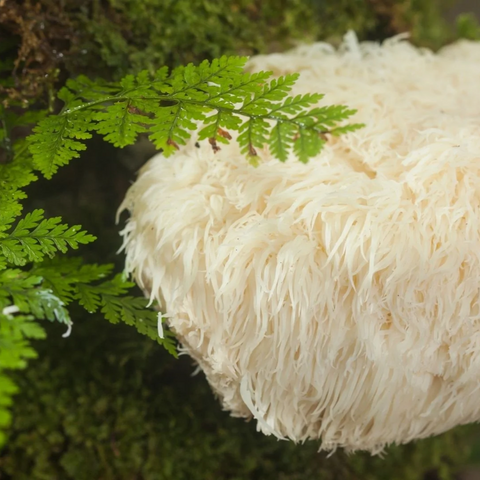
3. Tremella mushroom (Tremella fuciformis)
Tremella, or the 'beauty mushroom', is amongst the most beneficial fungi due to its high polysaccharide content, which helps promote skin hydration and elasticity. Studies have found that tremella can reduce the visible effects of ageing, such as wrinkles and age spots.
Tremella is best for:
- Skin health and hydration
- Reduction of visible signs of ageing
- Cellular vitality and regeneration
- Overall beauty boost
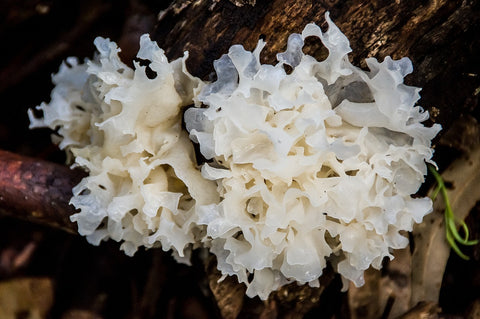
4. Maitake (Grifola frondosa)
Maitake, also known as 'hen-of-the-woods', is known for its ability to enhance the body's natural immunity. Maitake mushroom also contains compounds that may help to improve insulin sensitivity and promote healthy blood sugar levels.
Maitake is best for:
- Weight management
- Heart health support
- Regulation of blood sugar levels
- Reduction of cholesterol levels
5. Reishi mushroom (Ganoderma lucidum)
Reishi mushrooms, also known as 'the mushroom of immortality', have been used for centuries in traditional Chinese medicine to improve longevity and overall well-being. Reishi Mushroom is a rich source of antioxidants and bioactive compounds, including beta-glucans, triterpenes, and polysaccharides; compounds which have been shown to support a healthy immune system, improve sleep quality, and reduce inflammation.
Reishi is best for:
- Immune support
- Reduction of inflammation and stress levels
- Improved sleep quality
- Better overall health
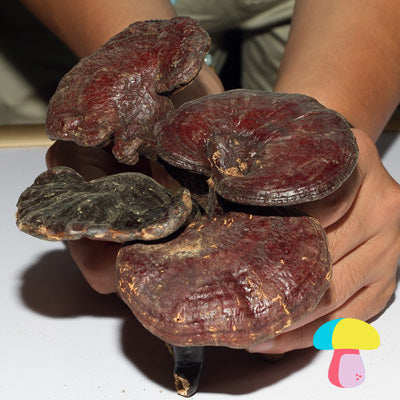
6. Cordyceps mushroom (Cordyceps militaris)
Cordyceps is a type of mushroom that grows on caterpillar larvae in the Himalayas. Cordyceps mushroom is a rich source of antioxidants and bioactive compounds, including cordycepin, polysaccharides, and adenosine. It is believed to have powerful anti-inflammatory and immune-boosting effects.
Cordyceps is best for:
- Increased energy and endurance
- Improved athletic performance
- Respiratory health
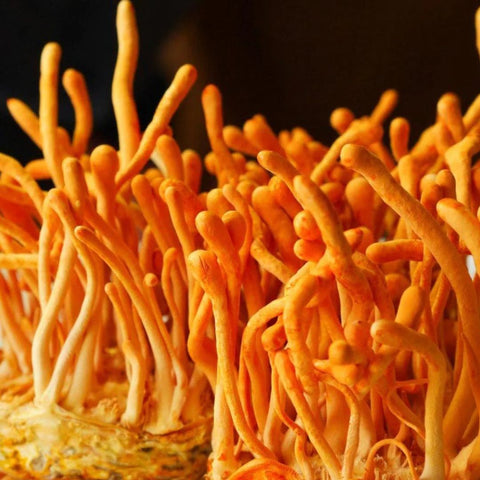
7. Shiitake mushroom (Lentinula edodes)
Shiitake mushrooms are one of the most popular types of medicinal mushrooms, due to their versatility in cooking as well as their health benefits. Shiitake is a rich source of antioxidants and bioactive compounds, including lentinan and eritadenine. It has been used in traditional Chinese medicine for centuries to treat a wide range of ailments, from allergies to hypertension.
Shiitake is best for:
- Immune system support
- Reduction of cholesterol levels
- Improved cardiovascular health
- Allergy relief
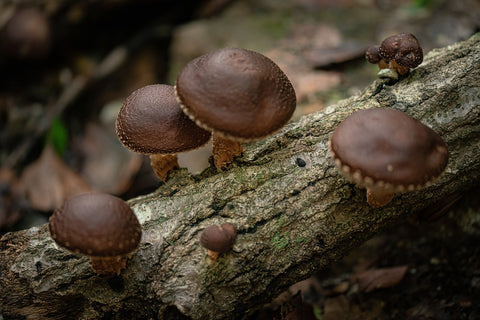
8. Chaga mushroom (Inonotus obliquus)
Chaga is a type of fungus that grows on birch trees in cold climates, such as Northern Europe and Russia. It is highly sought after due to its high antioxidant content, which helps protect the body from oxidative stress and damage. Chaga mushroom is also an excellent source of beta-glucans, which can help support a healthy immune system.
Chaga is best for:
- Immunity support
- Protection against oxidative stress and damage
- Reduction of inflammation levels
- Improved energy levels

9. Enoki mushroom (Flammulina velutipes)
Enoki mushroom is a type of fungus native to East Asia, with long, white stems and small caps. Enoki mushrooms are rich in antioxidants and contain high amounts of vitamin B2 and potassium, which can help support bone health. Studies have also found that enoki mushrooms may possess anti-inflammatory, anti-tumor, and anti-viral properties.
Enoki is best for:
- Bone health and support
- Decreased inflammation levels
- Potential protection against viruses and tumours

10. Meshima mushroom (Phellinus linteus)
Meshima mushrooms are a type of medicinal mushroom native to East Asia, with a unique and powerful flavor. Meshima mushrooms possess strong antioxidant properties and contain compounds that can help modulate the immune system. They have also been found to protect against some forms of cancer and cardiovascular disease. Meshima mushrooms can be consumed fresh or dried, and added to soups, stir-fries, and other dishes.
Meshima is best for:
- Immune support
- Potential anti-cancer properties
- Allergy relief
- Skin conditions (e.g. eczema)
Consuming Adaptogenic Mushrooms
There are several ways to consume medicinal mushrooms, including capsules, powders, teas, tinctures, and extracts. Each method of consumption has its own benefits and drawbacks, so it is important to choose the method that works best for you.
Capsules and powders are a convenient way to consume medicinal mushrooms, as they can easily be added to your daily routine. Capsules are pre-dosed, making it easy to ensure you are getting the right amount, while powders can be added to smoothies, drinks, or food.
Teas are another popular way to consume medicinal mushrooms. They can be made from dried or fresh mushrooms and are a simple way to enjoy the flavor and benefits of medicinal mushrooms.
Tinctures and extracts are highly concentrated forms of medicinal mushrooms, and a small amount can go a long way. They are often taken sublingually, which means they are placed under the tongue and absorbed directly into the bloodstream.
Regardless of the method of consumption, it is important to choose high-quality, organic mushrooms to ensure you are getting the most benefit from their medicinal properties. Additionally, it is important to consult with a healthcare professional before starting any new supplement regimen, especially if you are taking any medications or have underlying health conditions.
Mushroom Safety and Side Effects
While medicinal mushrooms are generally considered safe for most people, it is important to be aware of potential side effects and interactions. Some people may experience allergic reactions, such as itching, rash, or difficulty breathing, when consuming medicinal mushrooms. If you experience any adverse reactions, stop taking the supplement and consult with a healthcare professional.
Additionally, some medicinal mushrooms may interact with certain medications, including blood thinners and immunosuppressants. It is important to consult with a healthcare professional before taking any new supplements, especially if you are taking any medications or have underlying health conditions.
Consuming high doses of some medicinal mushrooms may also cause digestive upset, such as nausea, diarrhea, or stomach discomfort. It is important to follow the recommended dosage instructions on the product label or consult with a healthcare professional before use.
Finally, it is important to choose high-quality, organic mushrooms to ensure you are getting the most benefit from their medicinal properties. Some mushrooms may be contaminated with heavy metals or other toxins, so it is important to choose a reputable source for your supplements.
Overall, while medicinal mushrooms can offer many health benefits, it is important to use them safely and consult with a healthcare professional before starting any new supplement regimen.
Best Mushrooms for Health: Final Thoughts
In conclusion, medicinal mushrooms offer a wide range of wellbeing benefits, from immune system support to improved skin health. Our selected top 10 best medicinal mushrooms for health include Shiitake, Lion's Mane, Chaga, Turkey Tail, Cordyceps, Maitake, Reishi, Enoki, Meshima, and Tremella. While each mushroom has its own unique set of benefits, they all share a common theme of promoting overall health and wellness.
Incorporating medicinal mushrooms into your diet and supplement regimen can be a simple yet effective way to support your health and well-being. With so many options available, there is a medicinal mushroom that can benefit almost everyone. So why not give them a try and see how they can support your health journey? Check out our bestselling range of high-quality mushroom supplements.
Functional Fungi for Health FAQs
What are the best mushrooms to take daily?
The best mushrooms to take daily depend on your specific health needs. For general wellbeing, Turkey and Lion's Mane are two of the most popular and beneficial mushrooms. Other options include Tremella for improved skin health, Reishi for stress relief and better sleep, or Chaga for its detoxifying properties.
Which mushroom is best for heart health?
Maitake mushrooms are considered one of the best mushrooms for heart health due to their high content of bioactive compounds. Studies suggest that Maitake mushrooms may help reduce blood pressure, improve cholesterol levels, and even promote weight loss.
Which mushroom has the highest antioxidants?
Chaga mushrooms are known for their antioxidant activity and are often dubbed "the king of medicinal mushrooms". Chaga is particularly high in polyphenols and beta-glucans, which have strong antioxidant, antiviral, and anti-inflammatory properties.
What mushrooms are best for healing?
Reishi mushrooms are one of the best mushrooms for healing, as they have powerful anti-inflammatory and immune-boosting properties. Studies suggest that Reishi may help to reduce inflammation, boost immunity, and potentially even protect against certain types of cancer.
Which is the best mushroom for gut health?
Turkey Tail is one of the best mushrooms for gut health, as it is rich in prebiotics and polysaccharides that can help support a healthy microbiome. Studies suggest that Turkey Tail may reduce inflammation in the digestive tract, improve digestion, and even protect against certain types of gastrointestinal diseases.






